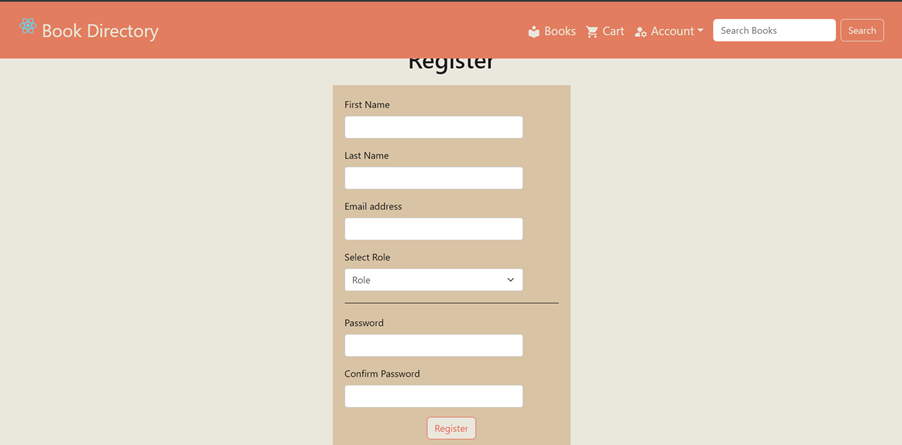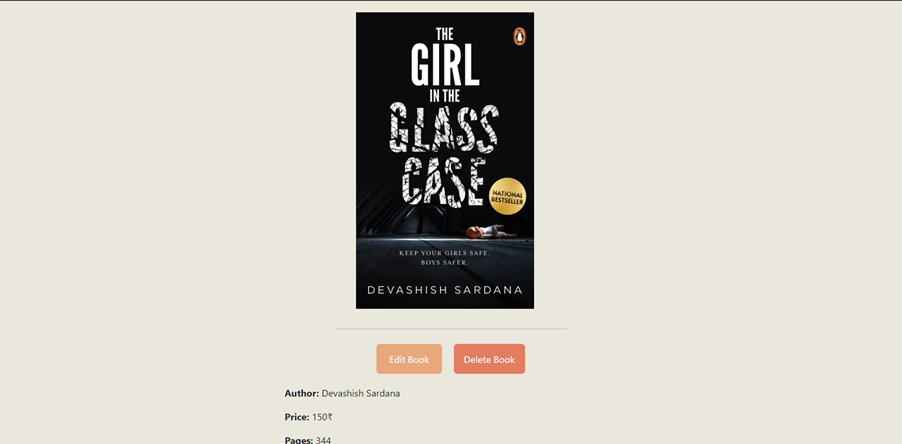Book Directory
Book Directory
CHAPTER 1: INTRODUCTION
1.1 PROJECT
DEFINITION:
The Book Store Web
Application is a modern and feature-rich online platform developed using
ReactJS, NodeJS , MongoDB , HTML, CSS. This application aims to provide a
seamless and engaging shopping experience for book enthusiasts, allowing them
to explore, purchase, and manage a diverse collection of books.
SCOPE OF THE PROJECT:
In the age of rapid
technological advancements, the world of literature has witnessed a significant
shift towards digital content. As avid readers ourselves, we recognized the
need for a platform that not only caters to this digital transformation but
also celebrates the essence of literature and its impact on people's lives.
Thus, the vision of The E-Book Store was born – a virtual haven that transcends
boundaries, offering a vast array of e-books from diverse genres, ready to be
explored and cherished by book enthusiasts worldwide.
Our platform's scope goes beyond merely providing
e-books; it aims to create a thriving ecosystem where readers and authors can
connect, fostering a sense of community around a shared passion for literature.
With personalized recommendations and a user-friendly interface, we strive to
enhance each user's reading experience, making it both enjoyable and seamless.
MOTIVATION OF THE PROJECT:
At the heart of The E-Book
Store lies our unwavering motivation – to ignite the love for reading and
knowledge acquisition among people of all ages. We firmly believe that books
have the power to inspire, educate, and transform lives. In a world teeming
with distractions, we want to rekindle the joy of losing oneself in the pages
of a compelling story or immersing in the depths of informative texts.
Our motivation also stems from our dedication to
support authors, especially emerging talent, by providing them with a platform
to showcase their work and connect with their readers. By fostering an
environment that encourages creativity and celebrates storytelling, we aim to
contribute to the growth of the literary community, promoting a vibrant
exchange of ideas and experiences.
1.2 DESCRIPTION:
The Book Store Web Application is a modern
and robust online platform designed and developed using cutting-edge technologies,
including ReactJS, NodeJS , MongoDB, HTML, CSS, and a custom
API. This feature-rich application aims to offer a seamless and delightful
shopping experience for book enthusiasts, providing them with a diverse
selection of books and user-friendly features.
Key
Features:
1.
User Authentication: Users
can create an account and log in securely to access personalized features. The
authentication process is implemented using API provided to us.
2.
User Roles: There are two different
roles in one is Customer and other is Admin and user can have features
according to user roles.
3.
Book Listing: The
application presents a vast catalogue of books, organized by genres, authors,
and categories. Book information includes title, author, cover image and
description.
4.
Book Detail: Users can see
details about the book by clicking on it and buy it or add it to cart.
5.
Search and Filters: Users
can easily search for books using keywords or titles
6.
Shopping Cart: Users can
add books to their shopping cart, review the cart, and proceed to checkout. The
cart dynamically displays the total price and allows for easy addition/removal
of items.
7.
Responsive Design: The
application is designed to be responsive, ensuring optimal user experience on
various devices, including desktops, tablets, and smartphones.
8.
Admin Panel: For
administrative purposes, an admin panel with secure login credentials can be
provided. The admin can manage book inventory, add new books, and view user
orders.
9.
Payment Integration: Demo
payment integration has been added.
10. Error Handling and Validation: The application incorporates
robust error handling and form validation to ensure data integrity and smooth
user interactions.
11. API Integration: The custom API created by me which handles
book data, user information, orders, and authentication processes.
12. Performance Optimization: The application employs various
performance optimization techniques to deliver a fast and efficient user
experience.
1.3 PROJECT
REQUIREMENTS:
1.3.1 Software Requirements:
Node.js and NPM, Code Editor (Visual
Studio Code), ReactJS and Dependencies, Postman (For API testing)
1.3.2 Hardware Requirements:
·
All new generation
processors and RAM should be minimum 2gb or above.
·
Storage: Adequate
storage space for the codebase, dependencies, and other related files is
required.
·
Internet Connection:
An internet connection is necessary for accessing online resources, libraries,
and API interactions during development and testing.
CHAPTER 2: SYSTEM FUNCTIONALITY
2.1 MAJOR FUNCTIONALITY:
The major functionalities implemented in the Book
Store include user registration and login, an extensive book catalogue with
easy browsing options, search and filter books using keywords and titles, a
shopping cart for adding and reviewing selected books, secure checkout with
payment options, admin panel to add new books or manage already listed books or
for managing registered users information and user profiles for managing
account information.
2.2 SYSTEM FLOW CHART:
Fig 2.1 Flow Chart-1
CHAPTER
3: IMPLEMENTATION
Fig
3.1 Implementation Snapshot-1
Fig
3.2 Implementation
Snapshot-2
Fig
3.3 Implementation
Snapshot-3
Fig
3.4 Implementation
Snapshot-4
Fig
3.5 Implementation Snapshot-5
Fig
3.6 Implementation
Snapshot-6
Fig
3.7 Implementation
Snapshot-7
CHAPTER 4: LIMITATIONS AND OUTCOMES
4.1 LIMITATIONS:
1. Client-Side Rendering
Limitation: Since the application relies on client-side rendering, it may
result in slower initial loading times, especially for large and book catalogues.
This can impact the user experience, especially on slower devices or internet
connections.
2. Search and Filtering
Performance: As the book catalogue grows, the search and filtering
functionalities may face performance issues due to the increased data
processing on the client-side. This could lead to slower response times and
potentially impact user satisfaction.
3. State Management
Complexity: While Redux and Context API are powerful tools for managing
application state, their implementation can become complex and hard to maintain
as the application grows. This might result in increased development time and
potential bugs.
4. Dependency Updates: Regular
updates to the project dependencies (React, Redux, Material UI, etc.) are
essential to ensure the application remains secure and up-to-date. However,
updating dependencies may introduce compatibility issues and require additional
testing and adjustments.
4.2 PROJECT OUTCOMES:
I had really challenging
experience working on this project. I also had to meet various pre-requisites
which were required like learning new languages such as JavaScript and ReactJS
which is Javascript library. It was overall a good experience to work with this
company. I learned to work in a disciplined environment which made me
understand the importance of submission before deadline. Overall working on
project in this internship was a great learning experience.
As a conclusion I’ve learned
how to code in JavaScript and ReactJS and for better state management Redux and
Context API. I became familiar with ReactJS, NodeJS and JavaScript. With
intensive research on how to use React, Redux and Javascript, we quickly
learned the basics, understood the syntax of the language and tried to adapt to
the language and the ReactJS environment as much as we could.
The main goal of our project
was to create a web service application as quickly as possible. Before starting
this project, we had to download NodeJS and Visual Studio Code. Both were free
and had easy steps to download. Additionally, we learned how to use NodeJS
command prompt in order to execute programs which we wrote on Visual Studio
Code.
First of all, we created a
plan on how to write such application in order to finish the project quicker.
We moved on from one milestone to the next milestone. Then we started to write
the code of this program and had to test several times until the code was
working perfectly in the end.
CHAPTER
5: FUTURE ENHANCEMENTS
5.1 FUTURE
ENHANCEMENTS IN PROJECT:
1. Enhanced Search and
Filtering: Improve the search and filtering functionalities to handle a larger book
catalogue more efficiently. Implement advanced search options, such as sorting
by popularity, price range, and publication date, to allow users to find books
more easily.
2. Social Media Integration: Integrate
social media platforms to allow users to share their favourite books, reviews,
and recommendations with their social networks. This feature can enhance user
engagement and drive more traffic to the application.
3. User Notifications: Implement
a notification system to inform users about special offers, discounts, new book
releases, and personalized book recommendations.
4. Reading Recommendations: Expand
the recommendation system to include personalized reading suggestions based on
user’s reading history and preferences. Incorporate machine learning algorithms
to offer more accurate and relevant book recommendations.
5. Mobile App Development: Consider
developing native mobile applications for Android and iOS platforms to expand
the reach of the Book Store.
6. Book Ratings and Comments
Moderation: Implement a moderation system for book ratings and comments to
ensure the quality and appropriateness of user-generated content. This helps
maintain a positive and respectful community environment.
CHAPTER 6: CONCLUSION
6.1 PROJECT CONCLUSION
In
conclusion, the development of the Book Store web application using ReactJS, NodeJS,
Context API , HTML, CSS, and the provided API has been a very great learning
for me. The project has resulted in a fully functional and user-friendly online
bookstore that offers an enriching book shopping experience for users.
The
major functionalities, including user registration and login, book catalog
browsing, book details and reviews, personalized book recommendations, shopping
cart, place order, admin panel, and user profiles, have been seamlessly
implemented and thoroughly tested.
The
API integration was a critical aspect of the project, and it was accomplished
with efficiency and precision. The custom API provided by the company
flawlessly handled book data, user authentication, and other interactions,
ensuring smooth communication between the frontend and backend components.
The
project's responsive and user-friendly interface, designed using Material UI
and responsive design principles, enhances user experience across various
devices. Additionally, the robust state management achieved through Javascript
and Context API ensures efficient handling of application state and user
interactions.
CHAPTER 7: REFERENCES
7.1 WEB REFERENCES:
·
https://nodejs.dev/en/learn/
· https://www.mongodb.com/docs/
·
https://book-e-sell-node-api.vercel.app/
·
https://www.freecodecamp.org/news/context-api-in-react/
·
Other reference (JS, CSS): https://www.w3schools.com/
·
https://www.w3schools.com/REACT/DEFAULT.ASP
·
https://www.javatpoint.com/reactjs-tutorial
·
https://www.geeksforgeeks.org/reactjs-tutorials/
·
https://www.w3schools.com/nodejs/
·
https://nodejs.dev/en/learn/
·
https://www.simplilearn.com/tutorials/nodejs-tutorial/what-is-nodejs
·
https://en.wikipedia.org/wiki/MongoDB
·
https://en.wikipedia.org/wiki/MongoDB
·
https://www.techtarget.com/searchdatamanagement/definition/MongoDB
·
https://www.javatpoint.com/mongodb-tutorial










Comments
Post a Comment